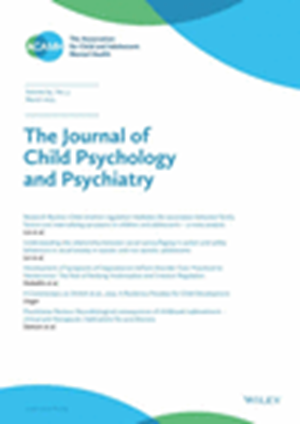Research Review: Mechanisms of change and between‐family differences in parenting interventions for children with ADHD – an individual participant data meta‐analysis
IF 6.5
1区 医学
Q1 PSYCHIATRY
引用次数: 0
Abstract
BackgroundUnderstanding the mechanisms of change and between‐family differences in behavioural parenting interventions for children with attention‐deficit/hyperactivity disorder (ADHD) may help personalise interventions. Therefore, we examined whether improvements in parenting are associated with changes in child behaviour and functional outcomes, and how these associations vary based on parents' baseline parenting levels.MethodsWe collected individual participant data including 19 randomised controlled trials focusing on children with ADHD (研究综述:ADHD儿童父母干预的变化机制和家庭间差异——个体参与者数据荟萃分析
背景:了解对注意缺陷/多动障碍(ADHD)儿童的行为父母干预的变化机制和家庭间差异可能有助于个性化干预。因此,我们研究了父母教养的改善是否与儿童行为和功能结果的变化有关,以及这些关系如何根据父母的基线教养水平而变化。方法:我们收集了个体参与者数据,包括19项针对ADHD儿童的随机对照试验(n = 1,720)。由父母报告的儿童多动症和对立行为严重程度的干预后立即测量,以及由父母或可能被掩盖的临床医生报告的功能损伤,被视为结果。我们通过干预后父母对建设性育儿(如表扬)、非建设性育儿(如体罚)和亲子情感(如温暖)的即时报告,估计了从干预(与控制)到儿童结果的途径,同时控制了儿童结果和育儿水平的基线值。每个育儿变量的基线值被用作介导途径的调节因子。结果干预后父母行为和亲子情感的改善共同解释了儿童ADHD严重程度、对立行为和功能障碍的同时改善。此外,当逆转路径的方向时,所有儿童结果的改善共同解释了育儿各方面的改善。非建设性养育和亲子情感的改善是干预对功能障碍的唯一解释,特别是对非建设性养育基线水平较高的家庭。结论我们的研究结果可能表明,父母行为和情感方面的改善与儿童行为问题和功能障碍的同时减少有关。然而,还需要更多的研究来探索父母教养与儿童结局之间潜在的因果关系。尽管如此,支持教育技能较差的家庭可能尤其重要,因为这些家庭中非建设性教育的减少与儿童功能障碍的治疗效果更强有关。
本文章由计算机程序翻译,如有差异,请以英文原文为准。
求助全文
约1分钟内获得全文
求助全文
来源期刊
CiteScore
13.80
自引率
5.30%
发文量
169
审稿时长
1 months
期刊介绍:
The Journal of Child Psychology and Psychiatry (JCPP) is a highly regarded international publication that focuses on the fields of child and adolescent psychology and psychiatry. It is recognized for publishing top-tier, clinically relevant research across various disciplines related to these areas. JCPP has a broad global readership and covers a diverse range of topics, including:
Epidemiology: Studies on the prevalence and distribution of mental health issues in children and adolescents.
Diagnosis: Research on the identification and classification of childhood disorders.
Treatments: Psychotherapeutic and psychopharmacological interventions for child and adolescent mental health.
Behavior and Cognition: Studies on the behavioral and cognitive aspects of childhood disorders.
Neuroscience and Neurobiology: Research on the neural and biological underpinnings of child mental health.
Genetics: Genetic factors contributing to the development of childhood disorders.
JCPP serves as a platform for integrating empirical research, clinical studies, and high-quality reviews from diverse perspectives, theoretical viewpoints, and disciplines. This interdisciplinary approach is a key feature of the journal, as it fosters a comprehensive understanding of child and adolescent mental health.
The Journal of Child Psychology and Psychiatry is published 12 times a year and is affiliated with the Association for Child and Adolescent Mental Health (ACAMH), which supports the journal's mission to advance knowledge and practice in the field of child and adolescent mental health.

 求助内容:
求助内容: 应助结果提醒方式:
应助结果提醒方式:


